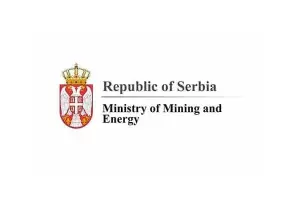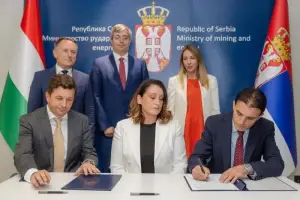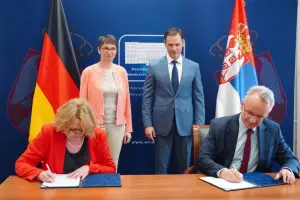- Serbia
Get to know Serbia
- Citizens
Culture and science
Health services
Pension and disability insurance
- Business
Employment
Economy
- Media
- Government
- Contact
Keep in touch
Contact form
Back
Keepin touch
Whether you have a question, comment, suggestion or any problem in the purview of the government, send us your message and we will try to respond as soon as possible. If your problem is not in our purview, we will forward your message to the relevant institution.
Q:
A:
Agreement signed on settling Agrobanka debt
Belgrade,
9 July 2007
Serbian Minister of Finance Mirko Cvetkovic and head of the Agrobanka executive board Dusan Antonic signed today an agreement on credit conversion of €43.5 million in the capital of Agrobanka, which will give the state ownership of 20% capital in the bank.
According to this agreement regarding the settling of debt on the basis of the loan by the World Bank and credit conversion in the Agrobanka capital, the state will write off a €123 million debt.
Following the signing of the document, Cvetkovic stressed that the agreement reached is satisfactory to both sides, since the state will receive a return of funds, and the bank will continue to work unhindered.
He recalled that before the credit conversion the state had ownership of 7% in Agrobanka, and stressed that the state has no interest in increasing its minority shares and when conditions in the stock exchange are favourable it will sell the rest of its shares.
The Minister explained that Agrobanka has a capital of some €201 million and 5,100 shareholders. He expressed expectation that following the signing of this agreement, the price of shares will increase from the current RSD 35,000 to RSD 50,000.
Serbian Minister of Trade and Service Predrag Bubalo said that the agreement has resolved one of the major inherited problems which had indirect implications regarding the speed and efficiency in the privatisation of Agrobanka.
According to Bubalo, this also corrects the great injustice done to the bank since during the pervious years, budget funds were placed in other banks.
Serbian Minister of Agriculture, Forestry and Water Management Slobodan Milosavljevic said that Serbia has the potential to become a regional leader in agribusiness, and will need the support of at least one powerful bank such as the Agrobanka.
Cvetkovic said that the Ministry of Finance has prepared a guide book on implementation of tax relief on purchase of a first house, which will be available to citizens from tomorrow in the Tax Administration and book shops of the Official Gazette.
He explained that the guide book will also contain forms which citizens need to fill for tax relief or a refund.
According to Cvetkovic, the buyer will fill the necessary forms to declare that this is purchase of first house, and then the Ministry will verify if the information is correct.
Regarding the introduction of a RSD 6 per kilogram excise duty on propane for vehicles, he said that one of the reasons for it is that the state wants to make a clear difference between fossil fuels and ecological fuels, which will be free of excise duty.
According to Cvetkovic, propane is a lesser pollutant than other oil derivatives, but since it originates from fossil fuels it is not fully ecological, as often thought.
Following the signing of the document, Cvetkovic stressed that the agreement reached is satisfactory to both sides, since the state will receive a return of funds, and the bank will continue to work unhindered.
He recalled that before the credit conversion the state had ownership of 7% in Agrobanka, and stressed that the state has no interest in increasing its minority shares and when conditions in the stock exchange are favourable it will sell the rest of its shares.
The Minister explained that Agrobanka has a capital of some €201 million and 5,100 shareholders. He expressed expectation that following the signing of this agreement, the price of shares will increase from the current RSD 35,000 to RSD 50,000.
Serbian Minister of Trade and Service Predrag Bubalo said that the agreement has resolved one of the major inherited problems which had indirect implications regarding the speed and efficiency in the privatisation of Agrobanka.
According to Bubalo, this also corrects the great injustice done to the bank since during the pervious years, budget funds were placed in other banks.
Serbian Minister of Agriculture, Forestry and Water Management Slobodan Milosavljevic said that Serbia has the potential to become a regional leader in agribusiness, and will need the support of at least one powerful bank such as the Agrobanka.
Cvetkovic said that the Ministry of Finance has prepared a guide book on implementation of tax relief on purchase of a first house, which will be available to citizens from tomorrow in the Tax Administration and book shops of the Official Gazette.
He explained that the guide book will also contain forms which citizens need to fill for tax relief or a refund.
According to Cvetkovic, the buyer will fill the necessary forms to declare that this is purchase of first house, and then the Ministry will verify if the information is correct.
Regarding the introduction of a RSD 6 per kilogram excise duty on propane for vehicles, he said that one of the reasons for it is that the state wants to make a clear difference between fossil fuels and ecological fuels, which will be free of excise duty.
According to Cvetkovic, propane is a lesser pollutant than other oil derivatives, but since it originates from fossil fuels it is not fully ecological, as often thought.
-
 Belgrade, 21 July 2025
Belgrade, 21 July 2025Construction of oil pipeline with Hungary to begin early next year
-
 Belgrade/Athens, 17 July 2025
Belgrade/Athens, 17 July 2025Serbia continues to align with EU in field of energy
-
 Kostolac, 14 July 2025
Kostolac, 14 July 2025First solar power plant Petka in Kostolac put into trial operation
-
 Belgrade, 11 July 2025
Belgrade, 11 July 2025Potential for improving cooperation with Belarus in many areas
-
 Požega, 5 July 2025
Požega, 5 July 2025Section of Pakovraće - Požega highway officially opened
-
 Belgrade, 2 July 2025
Belgrade, 2 July 2025Technical specifications defined for Serbia-Hungary oil pipeline
-
 Belgrade, 30 June 2025
Belgrade, 30 June 2025IMF confirms Serbia successfully implementing all agreed reforms
-
 Belgrade, 27 June 2025
Belgrade, 27 June 2025Double Taxation Avoidance Agreement with Germany signed
-
 Kostolac, 25 June 2025
Kostolac, 25 June 2025Construction of Kostolac wind farm nearing completion
-
 Belgrade, 24 June 2025
Belgrade, 24 June 2025Government supports request for new postponement of sanctions against NIS
